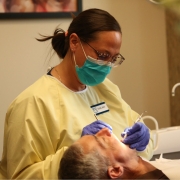What to Know About Dental Care As You Age
Are you getting older? We all are. The older you get, the more your teeth are at risk of various dental problems. Your dentist in Chardon, OH, can help. Knowing how age affects your dental health and what you can do about it can help you take care of your teeth. Here’s what you need to know about how your age affects your oral health and hygiene.
Age Puts You At Risk
As patients get older, they’re at increased risk of many dental problems, including gum disease and gum recession. There are many reasons that older people are at higher risk for these problems, including dry mouth and medications.
Some medications can put you at risk for various dental problems, and can also leave you with dry mouth. Saliva is important for your mouth because it helps wash away food and bacteria. If you have dry mouth, you could be at increased risk of gum disease.
Know the Signs of a Problem
Watch for these signs of a dental problem:
- Severe toothache
- Bad breath, even if you have recently brushed your teeth
- Tooth sensitivity
- Receding gums
- Gums bleed when you brush your teeth
- Loose teeth
If you’re experiencing any of the problems above, contact your dentist at Center Street Dental, Dr. Marino & Associates as soon as possible to get help.
Preventative Care Protects Your Teeth
There are many things you can do to take good care of your teeth as you get older. Below are some tips to protect your teeth.
- Brush your teeth twice daily. Brush your teeth every morning and evening. Brush for two minutes each time using a soft-bristle toothbrush.
- An electric toothbrush makes brushing your teeth easier. Some seniors struggle with mobility and are unable to brush their teeth well. Brushing your teeth with an electric toothbrush can help with this because electric toothbrushes make teeth cleaning easier.
- Staying hydrated can help you avoid dry mouth. If you have dry mouth, take care to drink plenty of fluids throughout the day.
Your Dentist Can Help
Unless your dentist tells you to do otherwise, see your dentist twice a year for dental checkups in Chardon, OH. Call today to make an appointment.








